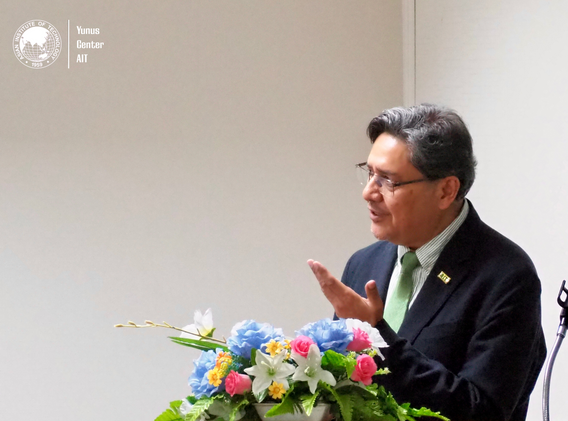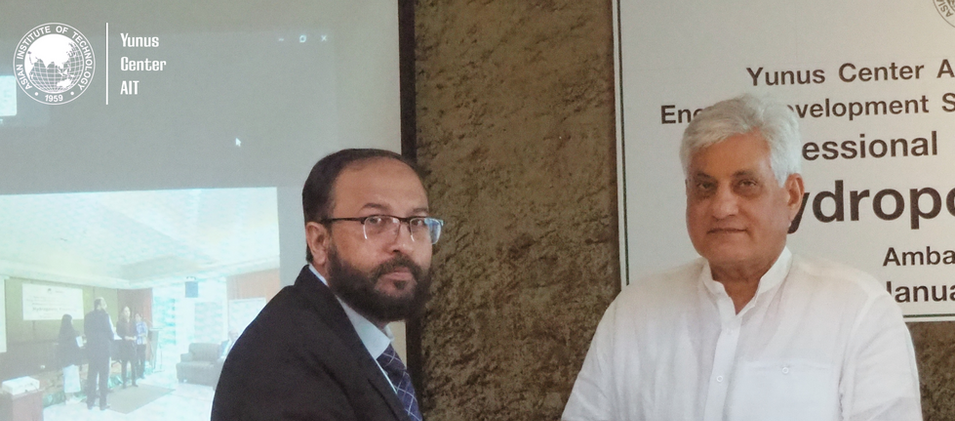


Hydropower Financing Training Empowers WAPDA Professionals in Bangkok
The Hydropower Financing Training, organized by the Regional Knowledge Hub (RKH) at the Yunus Center, Asian Institute of Technology (YCA) in Thailand, took place from January 27 to February 6, 2025. Hosted through the Energy Development: Services, Management & Technology (EDSMAT) program, this specialized training welcomed 20 participants from Pakistan’s Water and Power Development Authority (WAPDA).
Held across two esteemed venues—the AIT Conference Center (AITCC) and Ambassador Hotel Bangkok—the training combined academic rigor with practical insights.
Empowering Hydropower Finance Professionals
This 10-day professional training program was strategically designed to enhance participants' skills in tackling financial, economic, and risk-related challenges in hydropower development. With hydropower playing a crucial role in renewable energy solutions, the program aimed to strengthen its contribution to socio-economic progress and sustainability.
“This training is not just about academics; it’s about creating a space where your collective experiences lead to practical solutions. Think of this training as the beginning of discussions—inside the classroom and beyond—that will equip you to return to your offices with actionable strategies,” said Prof. Faiz Shah, Executive Director of YCA, during the opening ceremony.
Dr. Masood Ahmad, Retired Infrastructure Specialist from the World Bank, added: “This program is an opportunity to bring theory and practice together. It’s not just about learning financing techniques; it’s about exploring how we can adapt global lessons to local contexts.”
Training Program Highlights
Day 1 & 2 – Hydropower Financing: Dr. Masood Ahmad led engaging sessions on hydropower financing, sharing effective lectures and practical experiences to enhance participants’ understanding of financial strategies in the sector.
Day 3 – Project Case Studies: Participants conducted an in-depth analysis of two major Pakistani hydropower projects—The Tarbela Fourth Extension Hydropower Project and Dasu Hydropower Stage I Project—exploring financial structures and implementation challenges.
Day 4-7– Financial and Economic Planning: Dr. Nelson H. Enano, Jr., from the Center for Renewable Energy and Appropriate Technologies (CREATE), Ateneo de Davao University, Philippines, delivered an insightful lecture on the fundamentals of financial and economic planning.
Financial Analysis Tools for Hydropower Projects: Participants explored methods for assessing local economic costs, benefits, and project optimization.
Energy Financing: This session focused on developing investment and financial plans for hydropower projects, equipping attendees with key tools for financial structuring.
Hydropower Financial Structuring Models: Participants studied different financial models for hydropower investments and explored structuring strategies.
Day 8 & 9 – Hydropower Financing Risk Management: Tanatat Puttasuwan, Ph.D., a financial economist and risk management expert, conducted intensive sessions on mitigating financial risks in hydropower financing.
Day 10 – KLP Discussion and Closing Ceremony: The training concluded with a Key Learning Points (KLP) discussion, led by Dr. Masood Ahmad, Mr. Premchai Chenaphun, and Mr. Syed Irfan Hasnain Rizvi. Participants delivered effective presentations, which helped refine the training approach for future programs.
In the closing ceremony, Prof. Faiz H. Shah addressed the participants via Zoom, while Dr. Masood Ahmad and Mr. Syed Irfan Hasnain Rizvi shared final remarks on the program’s impact and the importance of continued collaboration.
Commitment to Innovation and Capacity Building
This training reflects YCA’s Regional Knowledge Hub (RKH) commitment to fostering innovation, collaboration, and capacity-building in the energy sector, supporting a more sustainable and efficient future for hydropower financing.
Through these sessions, participants not only gained technical expertise but also engaged in meaningful peer learning and networking, ensuring that the knowledge acquired translates into actionable solutions for hydropower development in Pakistan and beyond.










































